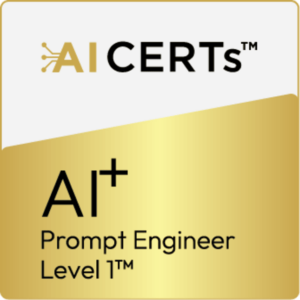- modules: 7
- Examination: 1
- Examination Time: 50 MCQs, 90 Minutes
- Passing Score: 70%
About Certification
The AI+ Prompt Engineer Level 1 Certification Program introduces learners from diverse backgrounds and levels of expertise to the fundamental principles of artificial intelligence and prompts engineering. Covering the history, concepts, and applications of AI, machine learning, deep learning, neural networks, and natural language processing, the program also delves into best practices for designing effective prompts that harness the capabilities of AI models to their fullest potential. Through a combination of theoretical instruction and practical exercises, including project-based learning sessions, participants acquire the skills needed to create and utilize prompts across various domains and objectives.
Prerequisites
- Basic knowledge of AI concepts and applications for understanding advanced topics.
- Familiarity with Programming Languages such as Python or R
- Proficiency in Data Analysis and Interpretation
- Knowledge of Machine Learning Algorithms and Techniques
- Awareness of Ethical Issues and Considerations in AI Development
Certification Modules
- Course Introduction Preview
- 1.1 Introduction to Artificial Intelligence
- 1.2 History of AI
- 1.3 Machine Learning Basics Preview
- 1.4 Deep Learning and Neural Networks
- 1.5 Natural Language Processing (NLP)
- 1.6 Prompt Engineering Fundamentals
- 2.1 Introduction to the Principles of Effective Prompting
- 2.2 Giving Directions
- 2.3 Formatting Responses
- 2.4 Providing Examples
- 2.5 Evaluating Response QualityPreview
- 2.6 Dividing Labor
- 2.7 Applying The Five Principles
- 2.8 Fixing Failing Prompts
- 3.1 Understanding AI Tools and Models
- 3.2 Deep Dive into ChatGPT Preview
- 3.3 Exploring GPT-4
- 3.4 Revolutionizing Art with DALL-E 2
- 3.5 Introduction to Emerging Tools using GPT
- 3.6 Specialized AI Models
- 3.7 Advanced AI Models
- 3.8 Google AI Innovations
- 3.9 Comparative Analysis of AI Tools
- 3.10 Practical Application Scenarios
- 3.11 Harnessing AI’s Potential
- 4.1 Zero-Shot Prompting
- 4.2 Few-Shot Prompting
- 4.3 Chain-of-Thought Prompting
- 4.4 Ensuring Self-Consistency in AI Responses
- 4.5 Generate Knowledge Prompting
- 4.6 Prompt Chaining
- 4.7 Tree of Thoughts: Exploring Multiple Solutions
- 4.8 Retrieval Augmented Generation
- 4.9 Graph Prompting and Advanced Data Interpretation Preview
- 4.10 Application in Practice: Real-Life Scenarios
- 4.11 Practical Exercises
- 5.1 Introduction to Image Models
- 5.2 Understanding Image Generation
- 5.3 Style Modifiers and Quality Boosters in Image Generation
- 5.4 Advanced Prompt Engineering in AI Image Generation
- 5.5 Prompt Rewriting for Image Models
- 5.6 Image Modification Techniques: Inpainting and Outpainting
- 5.7 Realistic Image Generation
- 5.8 Realistic Models and Consistent Characters
- 5.9 Practical Application of Image Model Techniques
- 6.1 Introduction to Project-Based Learning in AI
- 6.2 Selecting a Project Theme
- 6.3 Project Planning and Design in AI
- 6.4 AI Implementation and Prompt Engineering
- 6.5 Integrating Text and Image Models
- 6.6 Evaluation and Integration in AI Projects
- 6.7 Engaging and Effective Project Presentation
- 6.8 Guided Project Example
- 7.1 Introduction to AI Ethics Preview
- 7.2 Bias and Fairness in AI Models
- 7.3 Privacy and Data Security in AI
- 7.4 The Imperative for Transparency in AI Operations
- 7.5 Sustainable AI Development: An Imperative for the Future
- 7.6 Ethical Scenario Analysis in AI: Navigating the Complex Landscape
- 7.7 Navigating the Complex Landscape of AI Regulations and Governance
- 7.8 Navigating the Regulatory Landscape: A Guide for AI Practitioners
- 7.9 Ethical Frameworks and Guidelines in AI Development
Certification outcome
Upon successful completion of the AI+ Prompt Engineer Certification Program, learners will demonstrate proficiency in foundational AI concepts, principles of effective prompting, theoretical understanding of AI tools and models, prompt engineering techniques, image model concepts, and ethical considerations in AI. Participants will have acquired practical skills through project-based learning sessions and will be equipped to apply ethical frameworks in AI development. This certification signifies competence in AI prompt engineering and prepares individuals for ethical and innovative contributions to the field.











